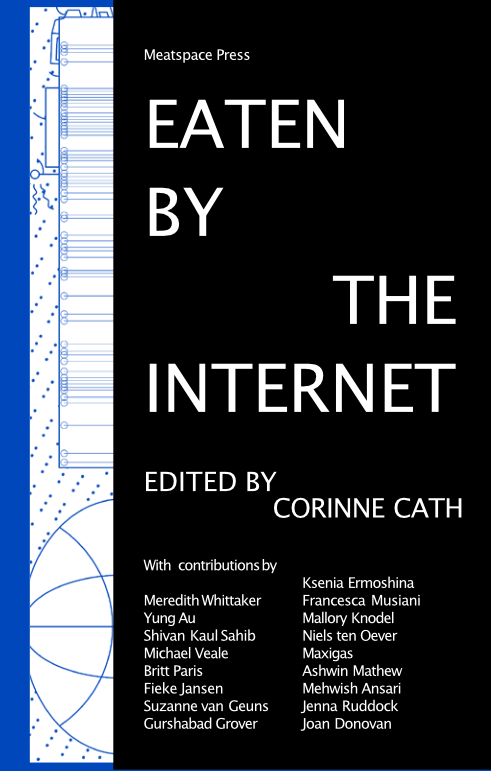
Ksenia Ermoshina, Francesca Musiani, 2023, “Encryption as a battleground in Ukraine”, in Corinne Cath (ed.), Eaten by the Internet, Manchester (UK), Meatspace Press, p. 82-88.
This book is available in open access.

This book makes internet infrastructure visible as a force of political power — through fifteen chapters contributed by a global set of researchers, activists, and techies. It roots contemporary technology debates in the politics of internet infrastructure and urges us to ask how can we ensure our infrastructures sustain us, rather than consume us?
Our world is eaten by the internet. This means that those who control the internet control the bounds of public speech, economic production, social cohesion, and politics, making its infrastructure a core political terrain in the networked age. The book’s chapters cover a wide set of topics, spanning from the global politics of content moderation by internet infrastructure to the colonialism inherent in the race to plug the moon, from the harms wrought by blockchain companies in rural America to the particularities of online censorship across Asia. The chapters take on thorny topics, discussing power consolidation in the advertisement and cloud industry, the role of internet infrastructure in the war in Ukraine, and tech’s environmental impact — amongst others.
The chapter by Ksenia Ermoshina and Francesca Musiani is titled “Encryption as a Battleground in Ukraine”.
To think about infrastructural politics today is to consider how internet infrastructures are defining contemporary geopolitical conflict. Russia’s invasion of Ukraine in early 2022 instigated an intense battle for control over Ukrainian informational infrastructures on its temporarily occupied territories, including landlines, cables, and cell towers. Political use of internet infrastructure in war zones is more and more common. This makes encryption — an important but much less visible aspect of infrastructure than, for example, broken cables or shot down cell towers — an important battleground in Ukraine. By extension, this means digital security is one of the crucial components of the physical security of people living under Russian occupation. However, researching Ukrainian users’ online practices in times of war shows that, paradoxically, advanced encryption is not always key to security. Rather, the war in Ukraine demonstrates that the physical and material functions of digital infrastructure, such as connectivity and internet access, can be more vital than privacy-enhancing technologies.